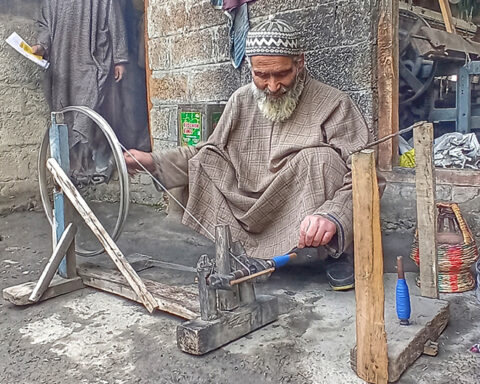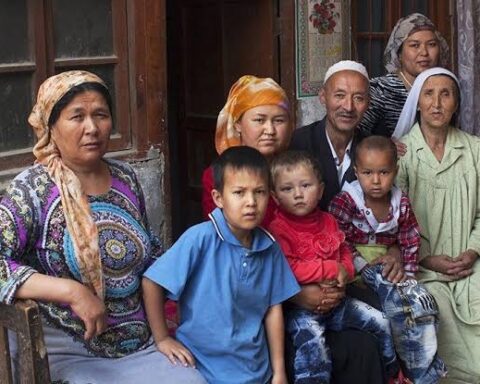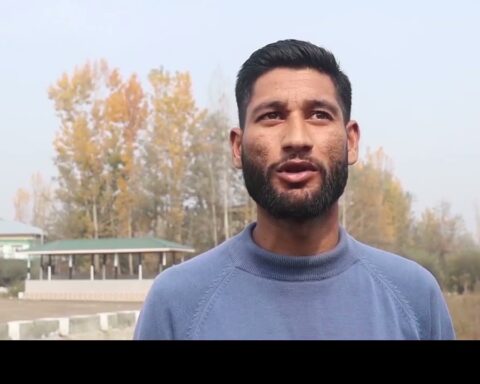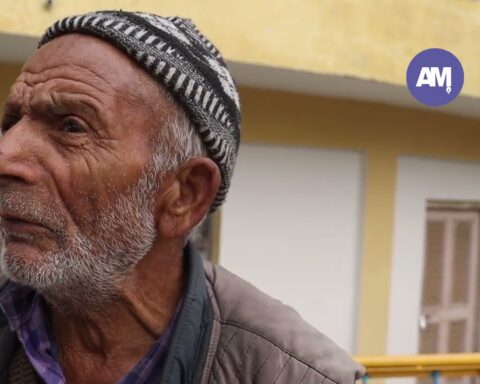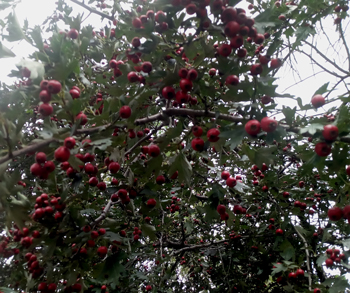He was born into a Muslim family, grew up in a Hindu majority area and attended a missionary school. Thus, at a very young age, he imbibed a composite culture and adopted a cosmopolitan worldview. When his parents and other family members suddenly left Gwalior for Pakistan in the wake of communal riots of 1964, young Muqtida Hasan who was pursuing his post-graduation, decided to make “Secular Hindostan” his home instead of following his family.
Many years later, after he had well established himself as Nida Fazli, a prominent poet of the sub-continent, he wrote in his autobiography, “by the time my family migrated to Pakistan, I had become aware, a change of place (of residence) can’t be a solution to the problems of a person.”
He was known for writing ghazals that capture the empirical realities of human life, such as Kabhi Kisi Ko Mukammal Jahan Nahin Milta, and adorning the music of Tanuja Chandra’s film, Sur—The Melody of Life, with his soulful lyrics. In the latter part of his life, Nida had come to Mumbai in 1964 after spending some time in Pune and Delhi.
A loose translation of a free verse which he wrote during his struggling period goes like this: “Armed with a big collection of words, he came to the city of sea, Bambai. The waves of the time have swept away all those words of love, hatred, humility, rebellion… Under the scorching sun, his entire wealth has vanished, except for one word: ‘No’. He has been repeating this word, ‘No’, without a pause. Like a drowning person clutching a straw in his
weak jaws, he is clashing with the currents of the sea with this ‘No’.”
Do Aur Do Ka Jod Hamesha Chaar Kahaan Hota Hai
Soch Samajh Waalon Ko Thodi Naadani De Maula
(Where does two plus two always equal four,
O lord! Please give some ignorance to the wise people)
Be it Ghazal, Nazm, Doha or Geet, Nida expressed himself in every format of poetry in the colloquial language, demonstrating his diverse ability and refreshingly unique style. Whether he wrote about interpersonal relationships or politics or the daily struggles of human life, he never distanced himself from biting realism. In many of his poems, he has beautifully exemplified the significance of destiny too.
Optimism remains the hallmark of his poems. He fiercely opposed communal politics and kept raising questions over the hijacking of religion by vested interests.
During his stint as a journalist with Dharmyug and Blitz, edited successively by the legendary Dharmveer Bharti and KA Abbas, he antagonised well-established poets and lyricists of the day, Sahir Ludhianvi, Kaifi Azmi and Jan Nissar Akhtar, among other members of the Progressive Writers Association.
“My problem with the progressive writers was that they completely abandoned the idea of God and left it to the discretion of religious fundamentalists and communal bigots,” he had once told this writer. “I follow the Sufi tradition because they brought God out of stone walls of temples and mosques. If we start ignoring Kabir and Amir Khusroo, we will soon have slogans like Naara-e-Taqbir and Har Har Mahadev echoing in every household.”
Koi Hindu, Koi Muslim, Koi Isaai Hai
Sab Ne Insaan na Banne Ki Qasam Khaai Hai!
(Someone is Hindu, someone is Muslim, someone is Christian
Everyone has vowed not to become a human being)
In his TV interviews, Nida used to narrate an incident from his childhood about how he got attracted to poetry. He was passing by a temple when he heard someone singing a beautiful bhajan of Surdas in which Radha, lover of Lord Krishna, was narrating her sorrow of being apart from her love (Krishna) to her maids. Nida was so mesmerised by
the poetry that he decided to become a poet himself.
Vrindavan Ke Krishna Kanhaiya Allah Hoo,
Bansi, Radha, Geeta, Gaiya Allah Hoo !
Maulviyon Ka Sajda, Pandit Ki Pooja,
Mazdooron Ki Haiya-Haiya Allah Hoo !
(Lord Krishna of Vrindavan God, Just He
Flute, Radha, geeta, cow, God, Just He
The prostration of the religious, the prayers of the priests,
The cries of the labourers, God, Just He)
An eagerly awaited presence at literary gatherings, Nida wrote several poems and verses on children and childhood, schools and education. Against the backdrop of partition and communal riots that took place in Independent India during his lifetime, he used these metaphors to uphold hope for humanity in his deeply moving poems.
Ghar Se Masjid Hai Bahut Dur Chalo Yoon Kar Lein,
Kisi Rote Huye Bachche Ko Hansaaya Jaaye
(The mosque is too far from home, so let’s do this
Let’s make a weeping child laugh instead)
The poem was used by Mahesh Bhatt in the national award winning film Tamanna (1997).
The song was set to music by Anu Malik and sung by Sonu Nigam.
Though he was a student of English literature, he had absorbed the essence of saint poets like Kabir and Meera besides Urdu poets like Mir, Ghalib and Nazeer Akbrabadi, an 18th-century poet, who for long was ignored by literary critics.
“I’ve always tried to establish the relationship of poetry with the people who have always suffered oppression at the hands of powers that be in the history of humankind,” he would say.
Har Aik Baat Ko Chup-Chaap Kyon Suna Jaaye,
Kabhi To Hausla Kar Kay ‘Nahin’ Kaha Jaaye!
(Why should one listen to every single thing silently?
At least sometimes one should muster courage and say ‘No’)
Nida, who wrote poignant poems like “Faateha” on his father’s death and “Passport Officer Ke Naam” with reference to Karachi as a mother separated from her son in “Bombay”, couldn’t attend the final rites of his father and mother in Pakistan. He kept pouring this regret in his poetry, attacking politicians on both the sides for the acrimonious relationship between the two countries.
When Sarabjit, an Indian imprisoned in Pakistan, was killed in a Pakistani jail and in retaliation, a Pakistani prisoner, Sanaullah was killed in Jammu jail, Nida wrote a telling poem referring to Sadaat Hasan Manto’s well-known character Toba Tek Singh, attacking jingoism and communal hatred, “Manto kay pagal khanay se nikla nahin abhi batwara (Partition still hasn’t left Manto’s madhouse).”
After his first visit to Pakistan, he had written a ghazal wherein he compared the sufferings of the common masses in both the countries. A couplet reads:
Khoonkhaar Darindo Ke Faqat Naam Alag Hain
Shehron Mein Bayabaan Yahan Bhi Hain Wahan Bhi!
(Only the names of blood-thirsty monsters are different,
Wastelands within cities exist here, as well as there)
Nida, whose wife is a Hindu, once wrote in an article for the BBC Hindi website, “A bit of Hinduism, Islam, Buddhsim, Sikhism and Christianity is part of the upbringing of my daughter.”
Well before he passed away on February 8, 2016, at 77, some of his books, which he had written for children, had become a part of the curriculum in schools in Maharashtra. He was honoured with the National Harmony Award for writing on communal harmony, and also received the Padma Shri.
Chahay Geeta Banchiye Ya Padhiye Quran,
Tera Mera Pyaar Hee Har Pustak Ka Gyan!
(Whether you read Geeta or recite Quran
Thine-mine love is the wisdom that every book offers)




